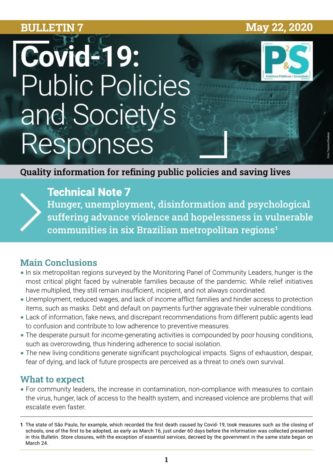Main Conclusions
- In six metropolitan regions surveyed by the Monitoring Panel of Community Leaders, hunger is the most critical plight faced by vulnerable families because of the pandemic. While relief initiatives have multiplied, they still remain insufficient, incipient, and not always coordinated.
- Unemployment, reduced wages, and lack of income afflict families and hinder access to protection items, such as masks. Debt and default on payments further aggravate their vulnerable conditions.
- Lack of information, fake news, and discrepant recommendations from different public agents lead to confusion and contribute to low adherence to preventive measures.
- The desperate pursuit for income-generating activities is compounded by poor housing conditions, such as overcrowding, thus hindering adherence to social isolation.
- The new living conditions generate significant psychological impacts. Signs of exhaustion, despair, fear of dying, and lack of future prospects are perceived as a threat to one’s own survival.
What to expect
- For community leaders, the increase in contamination, non-compliance with measures to contain the virus, hunger, lack of access to the health system, and increased violence are problems that will escalate even faster.
Recommendations
- The information collected suggests an urgent need to expand and coordinate efforts to distribute food as an emergency solution and not as a substitute for other structured social protection initiatives.
- It is important that the public sector encourages social and psychological support activities for families that increasingly find themselves in a situation of hopelessness and collapse.
- Given the distortion of guidelines and disinformation, it is essential that the different levels of government, from federal to states and municipalities, coordinate themselves to help communities respond more confidently to the protection measures against Covid-19.
Work group responsible
Coordination:
Graziela Castello (CEBRAP), Priscila Vieira (CEBRAP) and Monise Picanço (CEBRAP)
Researchers:
- Gabriela Palhares (Observatório da inovação-USP)
- Jaciane Milanezi (CEBRAP)
- Jonatas Mendonça dos Santos (USP)
- Laura Simões (USP)
- Rodrigo Brandão (USP)


